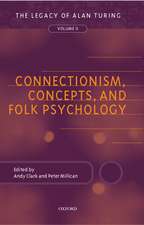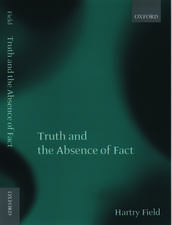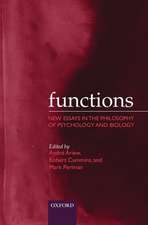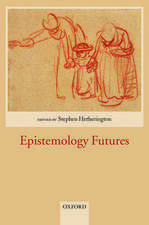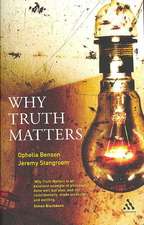Knowledge and the Gettier Problem
Autor Stephen Hetheringtonen Limba Engleză Paperback – 2 ian 2019
| Toate formatele și edițiile | Preț | Express |
|---|---|---|
| Paperback (1) | 283.25 lei 43-57 zile | |
| Cambridge University Press – 2 ian 2019 | 283.25 lei 43-57 zile | |
| Hardback (1) | 693.69 lei 43-57 zile | |
| Cambridge University Press – 31 aug 2016 | 693.69 lei 43-57 zile |
Preț: 283.25 lei
Nou
Puncte Express: 425
Preț estimativ în valută:
54.20€ • 56.25$ • 45.31£
54.20€ • 56.25$ • 45.31£
Carte tipărită la comandă
Livrare economică 17-31 martie
Preluare comenzi: 021 569.72.76
Specificații
ISBN-13: 9781316603970
ISBN-10: 1316603970
Pagini: 253
Dimensiuni: 153 x 228 x 13 mm
Greutate: 0.35 kg
Editura: Cambridge University Press
Colecția Cambridge University Press
Locul publicării:Cambridge, United Kingdom
ISBN-10: 1316603970
Pagini: 253
Dimensiuni: 153 x 228 x 13 mm
Greutate: 0.35 kg
Editura: Cambridge University Press
Colecția Cambridge University Press
Locul publicării:Cambridge, United Kingdom
Cuprins
Part I. Introducing Gettierism: 1.1. The year of Gettier; 1.2. Gettierism introduced; 1.3. Gettier cases introduced; 1.4. Gettierism refined; 1.5. Gettierism finalised: individual-Gettierism versus property-Gettierism; 1.6. Gettieristic responses to Gettier cases; 1.7. Supporting Gettierism; Part II. Explicating Gettierism: A General Challenge: 2.1. Introduction; 2.2. The fallibilism underlying Gettierism; 2.3. A general anti-Gettierism argument; 2.3.1. The strategy; 2.3.2. The argument; 2.3.3. Objection: merely definitional?; Part III. Explicating Gettierism: A Case Study: 3.1. Introduction; 3.2 Veritic luck; 3.3. The argument; 3.4. The argument, more metaphysically; 3.5. An alternative Gettieristic interpretation of safety?; 3.6. Belief-forming methods; 3.7. The backward clock; 3.8. The anti-luck intuition supplanted; Part IV. Explicating Gettierism: Modality and Properties: 4.1. Introduction; 4.2. Objection: modal fallacy?; 4.2.1. The objection; 4.2.2. The property of being Gettiered; 4.2.3. Property preclusion; 4.2.4. Predicates for the property of being Gettiered; 4.2.5. Property analysis; 4.3. Objection: another modal fallacy?; 4.3.1. The objection; 4.3.2. The objection's failure; 4.3.3. Individual-Gettierism versus property-Gettierism, again; Part V. Explicating Gettierism: Infallibility Presuppositions: 5.1. A question; 5.2. Some Gettieristic reasoning; 5.3. Realistic possibilities?; 5.4. A case study: virtue-theoretic manifestation; 5.4.1. Sosa/Turri's Gettieristic proposal; 5.4.2. Fallibilism within Gettier's challenge; 5.4.3. Turri's unwitting infallibilism; 5.4.4. A methodological moral; 5.4.5. Manifestation clarified; 5.5. Conclusion; Part VI. Gettierism and its Intuitions: 6.1. Intuitive support?; 6.2. Gettier's fallibilism, again; 6.3. A methodological moral, again; 6.4. A methodological question about Gettieristic assessments; 6.5. A methodological problem for Gettieristic assessments; 6.6. An objection and two replies; 6.7. Conclusion; Part VII. Gettierism Improved: 7.1. A compatibilist aim; 7.2. An old-fashioned account of not being Gettiered; 7.2.1. An internalist condition; 7.2.2. A fallibilist condition; 7.2.3. A non-reductive condition; 7.3. A non-reductive justified-true-belief conception of knowledge.
Notă biografică
Descriere
This book enriches our understanding of knowledge and Gettier's challenge, stimulating debate on a central epistemological issue.


